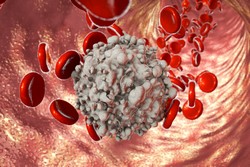Novel targets for lymphoblastic leukaemia
ALL is a haematological neoplasia characterised by chromosomal abnormalities that drive disease progression, impact prognosis as well as treatment stratification. B-cell precursor ALL (B-ALL) is associated with an arrest of B-cell development at the pre-B cell stage. Malignant blasts block B cell receptor (BCR) and its precursor, pre-BCR expression and signalling, thereby activating survival and proliferation at the expense of maturation and cell cycle arrest. Currently, B-ALL treatment entails combination chemotherapy which, however, causes acute and long-term toxicity. This clearly necessitates better and less toxic interventions that in turn, require an improved understanding of B-ALL signalling networks. Scientists of the EU-funded LEUKEMIA SIGNALLING (Defining the functions of novel integral membrane regulator, CMTM family in B cell development and acute lymphoblastic leukaemia) project wished to identify new membrane-associated drug targets for B-ALL. In this context, they focused on the first B cell developmental checkpoint, the pre-BCR stage. Genomic analysis of patients with B-ALL exhibiting genomic rearrangement and deregulated expression of the type I cytokine receptor CRLF2 revealed novel involvement for focal adhesion. Although the functional relevance of many of these abnormalities is largely unknown, they likely activate additional pathways, which may represent novel therapeutic targets. Another part of the project concentrated on the recently discovered Chemokine factor like Marvel like Trans Membrane proteins (CMTM) that interacts with the BCR during B cell development. Researchers followed a systems biology approach to identify the CMTM downstream signalling network. Furthermore, considerable effort went towards establishing the role of the apoptotic regulator DRAK2 in chronic lymphocytic leukaemia. Taken together, the findings of the LEUKEMIA SIGNALLING study reinforce the complex signalling that governs leukaemia blasts. Delineation of the regulatory role of CMTM in pre-B cell development and B-ALL does not only provide fundamental information on leukaemia onset, but opens new avenues for therapy.







